229 Search Results for partner strategies
August 13, 2020
by Carole Zangari -

Here in the US, millions of teachers, therapists, families, and students are planning to return to school, whether virtually, in person, or with some combination of the two. No matter what the format for instruction, one of the most important things for students who use AAC is having their SLPs, teachers, and families on the same page. They each have a different but very intense relationship with the student’s AAC system. Today, we reprise a popular post with some prAACtical thoughts on getting everyone pointed in the same direction. 1. Develop a communication profile of the student: In the initial weeks, try to get a baseline of how the student is communicating at the start of the year. For beginning communicators, we track things like their communicative intents (WHY they are communicating), modalities (HOW they are communicating), and the frequency of their communication. We’ve written about one of our favorite... [Read More...]
July 20, 2020
by Carole Zangari -

Finding ways to engage AAC learners is important to professionals across disciplines and service delivery settings. In today’s post, we feature guest author Kate McLaughlin, who is an SLP serving individuals with AAC needs in Connecticut. She shares a perspective on building engagement through the perspective of meaning making. ::::::::::::::::::::::::::::::::::::::::::::::::::::::::::::::::::: “Motivating” Emergent Communicators through Shared “Meaning-Making” & Communication Responsibility Are you a speech-language pathologist (SLP), teacher, or parent supporting an emergent AAC learner? Maybe you are just starting AAC with a learner who has a complex profile (for example, significant motor impairments, difficulties with motor planning, and/or sensory processing differences)? Maybe you have a learner who has learned to ask for some favorite things, but is not communicating beyond that? Do you struggle to “motivate” them? You’re not alone. I’ve met many kids who have been described as “not motivated to communicate.” I’ve also met many parents and professionals... [Read More...]
July 6, 2020
by Carole Zangari -
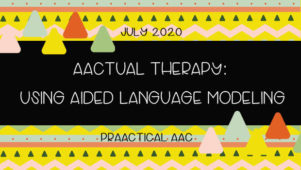
Although we’ve written extensively on the role of modeling in AAC, there are always new perspectives to consider regarding this evidence-based and widely-used strategy. Today, we feature SLPs Kate Grandbois and Amy Wonkka who share their approach to aided language modeling. :::::::::::::::::::::::::::::::::::::::::::::::::::::::::::::::::::::::: Bringing it all Together: Aided Language Modeling Most SLPs working in AAC have come across a variety of different interventions in their practice. Some, like aided language modeling, are popular and commonly seen at conferences. They are the most popular option on the intervention buffet. Others, like discrete trial training, are like the mystery meat – you think you know what it is, you don’t think you’re going to like it, and you’re going to watch while someone else tries it first. Sometimes these teaching procedures are straightforward, and sometimes they are confusing, intimidating, or complicated. You may find that choosing which intervention to use is influenced by... [Read More...]
July 2, 2020
by Carole Zangari -
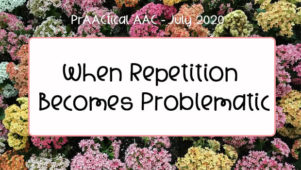
Have you worked with learners like these? Shameka wore a favorite t-shirt, featuring her beloved Moana, to her teletherapy session. She pointed to it to show her therapist and used her AAC device to say “Moana.” After acknowledging her Moana shirt and having a brief conversation about it, the therapist was ready to move on to the activities planned for that session. Shameka continued to bring up Moana many times throughout the session. Bryce’s love of pizza is no secret. It’s so important to him that Bryce can say ‘pizza’ with a word approximation, sign it with his unique version of the manual sign, or use a manual communication board or SGD to say the word. Most days, that’s a very good thing. But sometimes, Bryce starts mentioning pizza early in the morning and brings it up a few times an hour for the rest of the day. Many of... [Read More...]
June 8, 2020
by Carole Zangari -
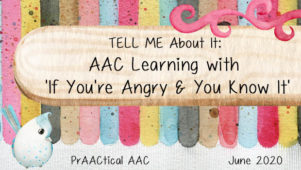
Welcome to a new edition of TELL ME ABout It, a series looking at ways to use children’s trade books to build AAC core vocabulary and literacy skills. Maggie Judson and Jeanna Antrim are back with more great ideas for AAC intervention, this time focusing on the book, ‘If You’re Angry and You Know It.’ Maggie and Jeanna are speech-language pathologists who work in the Assistive Technology Department for the Belleville Area Special Services Cooperative (BASSC) in central Illinois. They are AT/AAC facilitators and provide evaluations, direct therapy, consultations, and trainings. You can see their previous posts in the TELL ME About It series below. The Lunch Box Surprise Come Out and Play, Little Mouse No, David Go Away Big Green Monster What Do You Like? Here Are My Hands From Head to Toe I Went Walking Brown Bear, Brown Bear TELL ME AAC Literacy Kits Don’t miss their videos... [Read More...]
May 7, 2020
by Carole Zangari -
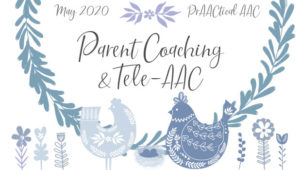
If I had a crystal ball, I wouldn’t be at all surprised if it told us that telepractice in AAC is here to stay. My guess is that when schools and clinics re-open there will still be a role for remote AAC services. That’s why I am so pleased that guest authors Jill Senner and Matthew Baud are returning to these pages to share their approach to using tele-AAC to educate and coach parents. Tele-AAC for All With social distancing, local shelter in place orders, and general concerns about the health of our high-risk clients who use AAC, most of us have made an abrupt transition to providing AAC therapy via telehealth. Doing direct therapy using video conferencing platforms might be going swimmingly for some clients who will sit and attentively gaze at the books, games, and other materials you present remotely. However, what about your younger clients? Or kiddos... [Read More...]
April 13, 2020
by Carole Zangari -
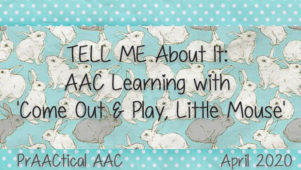
It’s time for another edition of the TELL ME About It series which focuses on AAC, language, and literacy learning with preschool children. Maggie Judson and Jeanna Antrim are back with more great ideas for AAC intervention, this time focusing on the book, Come Out and Play, Little Mouse. Maggie and Jeanna are speech-language pathologists who work in the Assistive Technology Department for the Belleville Area Special Services Cooperative (BASSC) in central Illinois. They are AT/AAC facilitators and provide evaluations, direct therapy, consultations, and trainings. You can check out the earlier posts in this series below. No, David Go Away Big Green Monster What Do You Like? Here Are My Hands From Head to Toe I Went Walking Brown Bear, Brown Bear TELL ME AAC Literacy Kits Be sure to see their videos modeling book reading with two AAC systems toward the end of this post. TELL ME About It:... [Read More...]
March 9, 2020
by Carole Zangari -
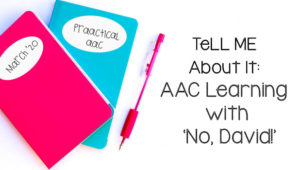
Maggie Judson and Jeanna Antrim are back with another guest post in the series, TELL ME About It. These two AAC SLPs work in the Assistive Technology Department for the Belleville Area Special Services Cooperative (BASSC) in southern Illinois. In today’s post, they cover ways to promote AAC use while focusing on the book ‘No, David!’ In this series, they discuss how they support preschool teachers who are implementing the TELL ME program with their young students. Maggie and Jeanna are both AT/AAC facilitators who provide evaluations, direct therapy, and consultations, and train school teams on AAC implementation. Enjoy their prAACtical suggestions and don’t miss their Lesson Plan, video demonstrations, and other resources at the end of the post. TELL ME About It: AAC Learning with ‘No, David!’ TELL ME About Reading: The seventh book in the TELL ME program (Teaching Early Language and Literacy through Multimodal Expression) is “No,... [Read More...]
February 10, 2020
by Carole Zangari -
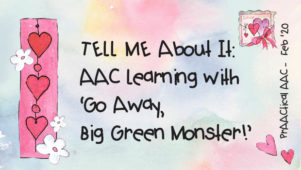
How can we infuse core vocabulary teaching throughout the preschool routine? Today, we welcome back Jeanna Antrim and Maggie Judson for another guest post in the TELL ME About It series. Maggie and Jeanna are SLPs who work in the Assistive Technology Department for the Belleville Area Special Services Cooperative (BASSC) in southern Illinois. They are AT/AAC facilitators and provide evaluations, direct therapy, consultations, and trainings with school teams. In this series, they discuss how they support preschool teachers who are implementing the TELL ME program with their young students. Today’s post covers ways to promote AAC use while focusing on the book ‘Go Away, Big Green Monster!’ Enjoy their prAACtical suggestions and don’t miss their Lesson Plan, video demonstrations, and other resources at the end of the post. TELL ME About It: AAC Learning with ‘Go Away, Big Green Monster!’ TELL ME About Reading: The sixth book in... [Read More...]
January 29, 2020
by Carole Zangari -
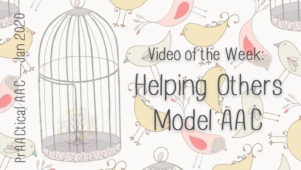
How can we help communication partners use aided language input to support AAC users? In today’s featured video, SLP Gretchen Storm discusses strategies that can be used in partner training? Many thanks to Gretchen for this presentation and Saltillo for hosting it so that we can all benefit. Direct Link to Video – https://www.youtube.com/watch?v=VBQASNVSfGc&feature=youtu.be









